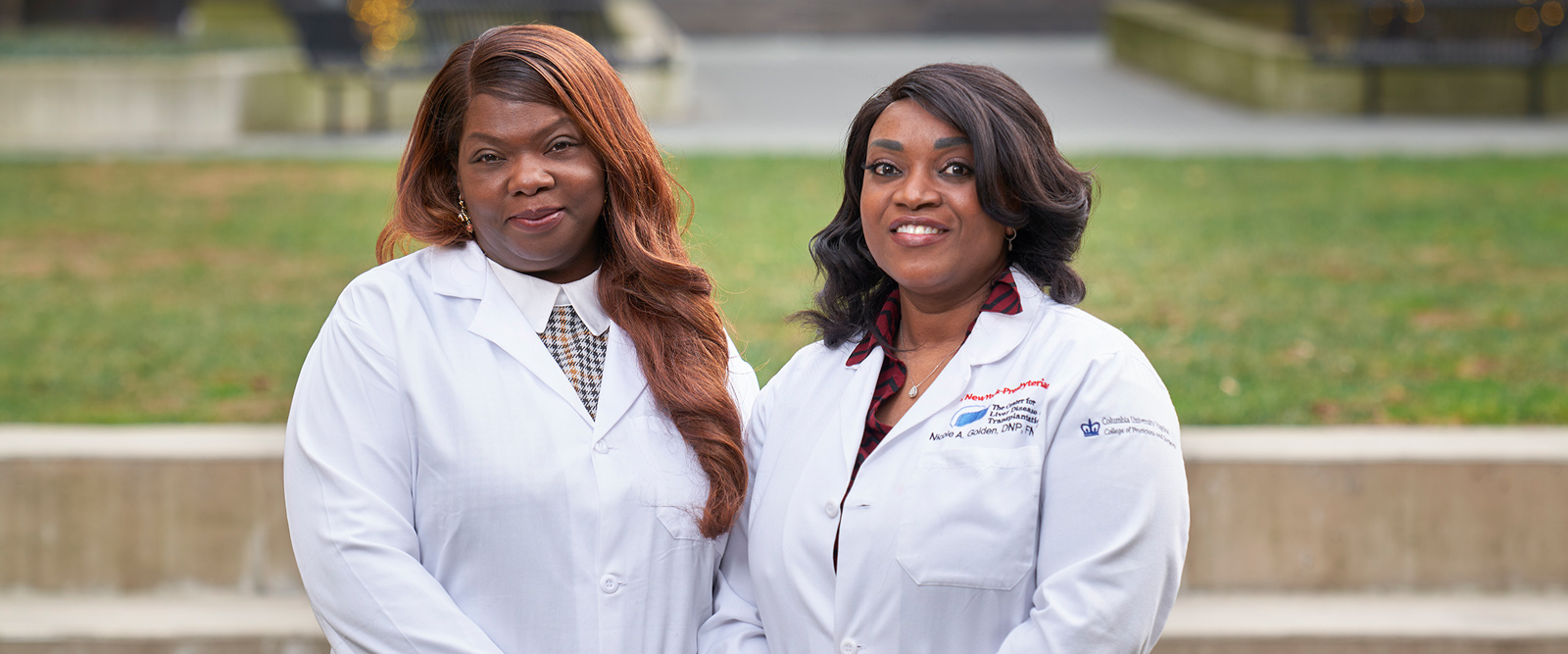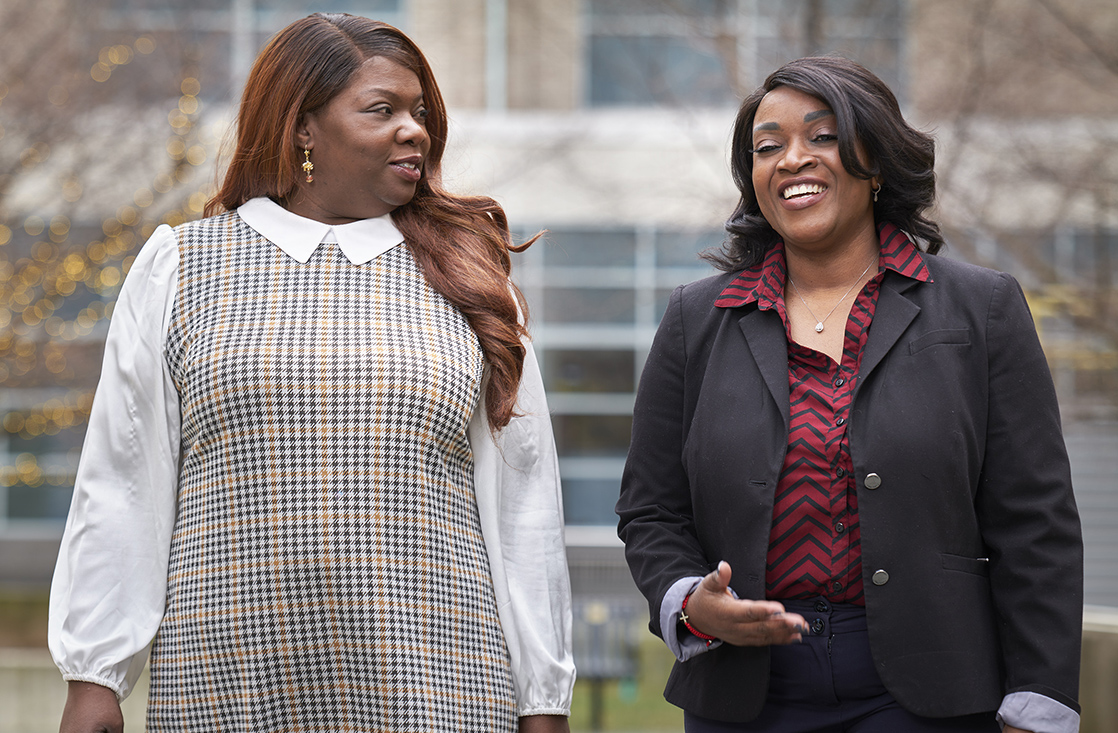‘We Needed to Do Something’
Two nurses from NewYork-Presbyterian are tackling persistent inequities in liver disease by meeting people where they live.

As COVID-19 hit New York City in March 2020, Monica Nelson-Kone, who was born and raised in the predominantly Black neighborhood of East New York, Brooklyn, immediately witnessed an all-too-familiar pattern unfolding in her community. Residents were falling sick and dying at higher rates compared to their white counterparts, who lived just a few subway stops away. “People were losing their lives initially and didn’t have access to similar resources,” says Nelson-Kone, a nurse and liver transplant coordinator at the Center for Liver Disease and Transplantation at NewYork-Presbyterian/Columbia University Irving Medical Center. “For me, it was personal. I had COVID-19, and when I was recovering at home, I saw our city asking for help. We needed to do something.”
With the pandemic exposing the devastating impact of health inequities, Nelson-Kone was motivated to create change. She decided to focus her efforts in the area she was most familiar with: liver disease. Over the next two months, the idea for the Black Liver Health Initiative took shape. Nelson-Kone reached out to fellow nurses, including Nicole Golden, a nurse practitioner at the Center for Liver Disease and Transplantation.
Golden had moved to the U.S. from Guyana at age 11 and grew up in New York. As a nurse practitioner, she has worked with liver patients for over a decade and is well aware of the alarming statistics on liver disease: It is one of the leading causes of death among Black Americans, and deep disparities persist. Black men are 60% more likely and Black women are 30% more likely to have liver and intrahepatic bile duct cancer (IBD) and to die from the disease compared to whites.
“Even though the burden of liver disease is higher, we don’t see many Black patients,” says Golden. “We give such wonderful care here at the hospital. If we get people in, we can help manage their condition, but getting them in is the challenge. The only way is to meet people where they live.”
So they decided to focus the Black Liver Health Initiative on reaching out to communities and building trust — whether in churches, schools, or neighborhood health clinics.
Call to Action
It was during the early planning days of the initiative that the country faced a racial reckoning. At NewYork-Presbyterian, doctors, nurses, and specialists from every area joined anti-racist protests across the country after the killing of George Floyd and rallied for health justice and social change.
We give such wonderful care at the hospital. If we get people in, we can help manage their condition, but getting them in is the challenge.
Nicole Golden
Golden and Nelson-Kone felt a sense of urgency and wrote to NewYork-Presbyterian’s CEO and President, Dr. Steven J. Corwin, after he spoke to staff about the need to address health disparities and fight for health justice. They asked for a meeting to share their idea for the Black Liver Health Initiative. He responded immediately and wanted to speak the next day, so they stayed up all night on Zoom creating a presentation, which was a hit.
“That’s when the fire really started,” says Nelson-Kone. “After that, we started the work and support came.”
Forward Progress
In June 2020, the Black Liver Health Initiative officially launched. Golden and Nelson-Kone decided to pilot the program in East New York, because it is a neighborhood with significant liver disease disparities and because Nelson-Kone has a close connection to the community.
Over the past two-and-a-half years, they have partnered with local faith leaders, politicians, and health care providers to talk to residents about liver health, screenings, healthy diets, and exercise. They organized webinars with their colleagues and spoke at multiple transplant forums discussing and promoting equity in liver care. Since the launch, their outreach has resulted in four lifesaving organ transplants and a new transplant access program in East New York. The team has also grown — there are now 14 members, including staff from NewYork-Presbyterian/Weill Cornell Medical Center. This year, their goal is to gain funding for increased community screening for liver disease.
The initiative has been applauded by NewYork-Presbyterian’s Dalio Center for Health Justice, which was launched in October 2020 to promote health equity and reduce disparities. “The Black Liver Health Initiative, and the work of Monica and Nicole, has been inspiring,” says Dr. Julia Iyasere, the executive director of the Dalio Center. “They’ve greatly influenced our work in the Center — we’re now working with our Hepatology departments to identify patients who would benefit from earlier intervention and have expanded our work to include support of a comprehensive patient education and navigation program in chronic kidney disease.”

Monica Nelson-Kone (left) and Nicole Golden share a mission to increase access to liver care in the Black community.
For Golden and Nelson-Kone, the initiative provides purpose. “I believe that whatever your purpose is in life, do it with the utmost humility,” says Golden. “We are engaging in the process of health equity by tearing down disparities, while building innovative ways of promoting health equity in underserved populations.”
Adds Nelson-Kone, “It is about community first. We know the patients are out there, because the statistics on liver and IBD cancers have given us insight into the health disparities for Black patients. So we are going into neighborhoods to find patients in need.”
Additional Resources
Learn more about the Black Liver Health Initiative.
See how you can sign up to become an organ donor.
